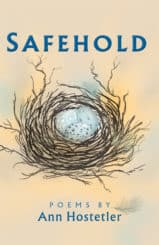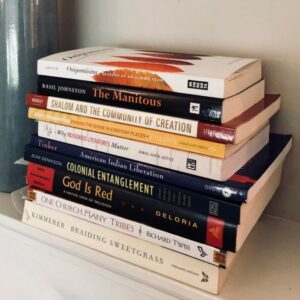
There’s something about poetry that is particularly grounding for me. Poetry stops time in unusual ways, quieting my chaotic mind enough to take in every word. The pictures painted in each stanza form so clearly in my imagination that I find myself lost in the author’s world. Many of us enjoy poetry, but do not find ourselves reading it as often as we’d like. Yet when we do take the time to sit and read, we realize that it’s something we desperately need more of in our lives.
Poetry is something we desperately need more of in our lives.
Ann Hostetler’s poetry in Safehold is the kind of poetry you really want to sit with. It is refreshingly holistic. Hostetler blends the sacred and ordinary in profound ways that never come across as contrived. Whether it was her intention or not, she easily convinces the reader that these elements of reality should never have been separated in the first place. I found myself, as someone from a culture of stubborn isolation, being drawn to look at everyday life in a new way; seeing how the parts of my day that I want to rush through as a woman, as a wife, as a caregiver, are actually countless chances to see beauty and therefore the presence of God.
In her book, Hostetler captures moments from her life in a way that conveys meaning, both emotionally and aesthetically. She discusses a wide range of experiences, including her own childhood, adult life, marriage, child-rearing, traveling, religious life, taking care of aging parents, and remembering them when they’ve gone.
Reading Hostetler’s poetry makes me want to know more about her life and her family’s story beyond what she’s included in the pages. She hints at things in brief, subtle ways that pique curiosity. Yet perhaps they are such private details that if the reader were to sit down with her, they would not want to be rude in asking about them.
In the first section of the book, Hostetler’s poem “Self-Portrait” gives the reader an engaging snapshot of who she is as a woman and an author in the world. In 14 lines, Hostetler emerges as a deeply thoughtful, eclectic, and delightfully amusing person. These are characterizations one might make of many poets, yet we also learn, perhaps surprising to some readers, that Hostetler is a Mennonite.
A reader unfamiliar with Mennonite life might suppose that the theology and lifestyle are limited to a strict moral code, geared towards simplicity and isolation from “the world.” How could a Mennonite author write about yoga or politics or women’s body parts? But from the testimony of friends who are a part of various Mennonite churches and organizations, I’ve learned that many Mennonites are mission-oriented, supporters of creativity and social justice, and just as theologically diverse as any other Christian denomination.
The history of Hostetler’s Pennsylvania Dutch family leads the reader back in time to places like Nazi Germany, and situations of religious shunning. Poems such as “Choosing Sides” and “Settling the Score” introduce the reader to the particular pains and curiosities associated with living as an Anabaptist and/or Mennonite. Hostetler’s family annals, mentioned throughout the book, are representative of the Church’s history: reminding us of times when people claiming to believe in the same Christ persecuted and even killed each other over all kinds of differences in theology.
Hostetler’s family annals, mentioned throughout the book, are representative of the Church’s history: reminding us of times when people claiming to believe in the same Christ persecuted and even killed each other over all kinds of differences in theology.
From family history to personal travel, Hostetler leads the reader through a time when she spent time in the country of her family’s origin. In Part Two of Safehold, Hostetler writes about seemingly incongruent experiences such as visiting the German Hygiene Museum (which at one point, Hostetler mentions, was “implicated in eugenics”) and practicing yoga with a Japanese teacher while listening to a grandmother speak to her grandchildren in Russian. Hostetler gives the reader a new sense of wonder about life, providing a way for us to reflect on how our own stories might be written in rhyme.
A strong theme throughout Safehold is the interwovenness of life, death, and grief. Hostetler invites the reader into the intimate details of caring for her aging parents, the inevitable moment of their passing, and the rituals she establishes in the wake of their loss. I can only judge by the limited information Hostetler shares, but as a fellow caregiver who knows how tiring (physically, mentally, emotionally, and spiritually) it can be to attend to all of the details of another’s daily life, I would say that she cared for her parents well.
Just as Jesus cleaned the feet of His disciples, someone such as Hostetler, who gives such loving attention to her parent’s feet, shows her willingness to serve with humility. I have a lot of respect for Hostetler after reading poems such as “Transfiguration” and “The Sacrament of Shoes.”
My two favorite poems in Safehold are found in the last section, titled “Legacy.” The first is the title poem of the book, “Safehold.” In it, Hostetler expresses what many of us felt (and still feel) around the time of the current U.S. administration’s disturbing nascency: that we need to gather those we love closely around us so that we might weather this storm together. She compares our time to Noah’s building of the ark: signs of trouble all around, yet the whole earth did not believe in their impending doom. Will we heed the signs now? I wonder this along with Hostetler.
“For Those Who Would Save The World” perfectly complements “Safehold.” Those of us who have seen the signs and have wept over them should take note, and ask what we could possibly do to bring any light to the darkness that has enveloped us. Hostetler encourages us to see our humanity and humility, to see the world as Christ sees it. This is a poem that teaches us once again that God’s ways are not ours, but also that God knows our weaknesses even more intimately than we do.
You don’t have to travel far to know suffering,
though you may carry it to the end of
the desert before you discover
it’s yours. Before you discover the light
failure lets into the darkness.
Polished by forgiveness, our failures
are the only possible windows
through which to truly see.
All else is mirrors
and an endless craving for
a reflection of worthiness.
Remember—Christ was wounded
so he could feel like you.
 Adriel Rose is a caregiver, writer, and an avid reader with a passion for learning and social justice. You can read more of her thoughts on her blog or follow her on Twitter.
Adriel Rose is a caregiver, writer, and an avid reader with a passion for learning and social justice. You can read more of her thoughts on her blog or follow her on Twitter.


